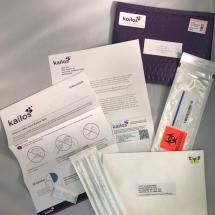Pharmacogenetics and Opiate Metabolism
You’ve just started your shift in the Emergency Department when a desperate mother brings in her daughter. She reports her daughter is having trouble breathing and was recently making jerking movements.1 The patient, a 14-year-old girl with Angelman syndrome, was experiencing what the mother perceived as hip pain the night prior to the ER visit. The mother administered the patient one dose of Tylenol #3 at that time.

The morning of the ER visit, the mother administered a second dose of the medication due to sustained irritability and pain symptoms exhibited by her daughter. The patient’s exam is consistent with the symptoms described by the patient’s mother, and fearing an overdose of codeine from the Tylenol #3, you administer naloxone, which is effective in relieving the patient’s symptoms. Because an overdose is highly unlikely given the dosage of Tylenol #3 administered and the weight of the patient, you advise the patient to follow up with pharmacogenetic testing to determine if the suspected overdose was due to altered functionality of the CYP2D6 gene. Interestingly, the testing reveals the patient possesses a nonfunctional CYP2D6 enzyme, which renders the patient unresponsive to codeine. Her clinicians hypothesize that her symptoms were likely caused by a lack of pain relief, rather than opioid intoxication. It is unclear, however, why the naloxone was effective in alleviating her symptoms during the ER visit.
Our case study illustrates the incredible utility of pharmacogenetic testing, particularly when administering medications, such as codeine, that can elicit severe, life-threatening side effects. Individuals that lack CYP2D6 activity, like the patient in our case study, are known as CYP2D6 “poor metabolizers” (PM) and receive no analgesic effect from codeine.2 Insufficient pain relief is a serious medical concern, as it often compels patients to ask for either a higher dose of or a change in medication, which can easily be misinterpreted as drug-seeking behavior. Other CYP2D6 mutations or duplications can result in the ultra-rapid metabolism of codeine,3 which can lead to abnormally high and potentially life-threatening levels of morphine in the patient.4 This has led the FDA to release safety announcements5 restricting the use of codeine in children and breastfeeding mothers. Importantly, pharmacogenetic testing can help patients on both extremes of the CYP2D6-metabolizer spectrum: it can prevent not only a potential opioid overdose but also a lack of pain relief.
The simplest way to evaluate the metabolizer status of a patient is through pharmacogenetic testing. Kailos Genetics’ InspexionTM pharmacogenetic test reports the metabolizer status of key pharmacogenes, including CYP2D6, making it one of the most comprehensive pharmacogenetic panels in the industry. Our CLIA-certified laboratory utilizes next generation sequencing (NGS) in concert with our TargetRichTM proprietary workflow to produce high quality sequences with unparalleled accuracy.
We extract DNA through a buccal swab collection kit that can be administered on-site or at home by the patient, ensuring sample collection is simple, quick and painless. Testing is completed in about two weeks and the results are released to the physician to inform future treatment. If test interpretation assistance is required, Kailos Genetics has partnered with genetic counseling service providers and can facilitate that relationship. We understand that the goal of precision medicine is the safest, most effective treatment for each and every patient. Kailos makes it possible.





